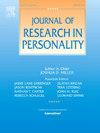人格特质对职业幸福感的核心、组成和发展的贡献
IF 3.1
2区 心理学
Q2 PSYCHOLOGY, SOCIAL
引用次数: 0
摘要
本文旨在阐明五大人格特质如何预测核心职业幸福(即组成部分的共同方差)之外的三个独特职业幸福成分(即与其他两个成分不重叠的方差)的个体差异和变化。我们将职业幸福感定义为工作满意度、工作意义和工作心理丰富性,并考虑了员工在职业幸福感组成部分中的优先级。在7个月的测量波中,N = 612名参与者提供了数据,使用线性混合效应模型、生长曲线分析和多项回归分析对数据进行了分析。所有五种人格特质都能正向预测核心职业幸福感。与独特的职业幸福成分的关系有所不同。情绪稳定性、责任心和开放性最能预测职业幸福感。开放性最能预测核心职业幸福感的增长。开放性和亲和性是员工职业幸福感优先级的最佳预测因子。本文章由计算机程序翻译,如有差异,请以英文原文为准。
The contributions of personality traits to the core, components, and development of occupational well-being
This article aims to clarify how the Big Five personality traits predict individual differences and changes in three unique occupational well-being components (i.e., the variance that does not overlap with the other two components), beyond core occupational well-being (i.e., the shared variance of the components). We conceptualized occupational well-being as job satisfaction, work meaningfulness, and work psychological richness, and considered employees’ priorities in occupational well-being components. Across seven monthly measurement waves, N = 612 participants provided data, which were analyzed using linear mixed-effect models, growth-curve analyses, and multinomial regression analyses. All five personality traits positively predicted core occupational well-being. Relationships with the unique occupational well-being components differed. Emotional stability, conscientiousness, and openness most strongly predicted occupational well-being. Openness most strongly predicted growth in core occupational well-being. Openness and agreeableness were the best predictors of employees’ priorities in occupational well-being components.
求助全文
通过发布文献求助,成功后即可免费获取论文全文。
去求助
来源期刊

Journal of Research in Personality
PSYCHOLOGY, SOCIAL-
CiteScore
5.40
自引率
6.10%
发文量
102
审稿时长
67 days
期刊介绍:
Emphasizing experimental and descriptive research, the Journal of Research in Personality presents articles that examine important issues in the field of personality and in related fields basic to the understanding of personality. The subject matter includes treatments of genetic, physiological, motivational, learning, perceptual, cognitive, and social processes of both normal and abnormal kinds in human and animal subjects. Features: • Papers that present integrated sets of studies that address significant theoretical issues relating to personality. • Theoretical papers and critical reviews of current experimental and methodological interest. • Single, well-designed studies of an innovative nature. • Brief reports, including replication or null result studies of previously reported findings, or a well-designed studies addressing questions of limited scope.
 求助内容:
求助内容: 应助结果提醒方式:
应助结果提醒方式:


